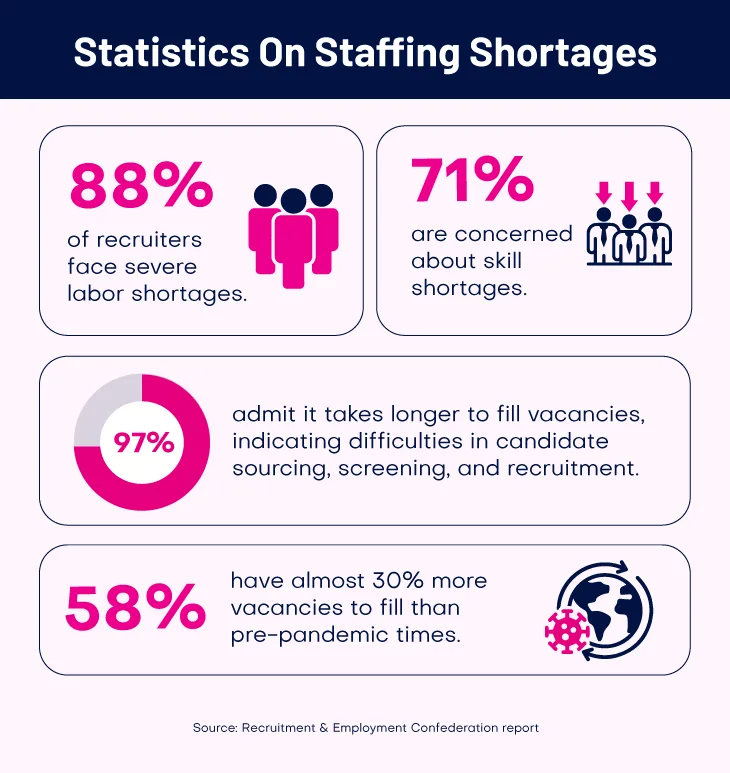Topics: Candidate Sourcing, Recruitment Process Outsourcing, skills shortage, Talent Acquisition, Understaffing
5 Ways in Which Understaffed Firms Benefit from Offshore Recruitment
Posted on October 14, 2024
Written By Abishek Balakumar

Understaffed and overwhelmed? You’re not alone. Staffing firms worldwide are struggling with these challenges and facing the consequences of losing a lot of new clients because of a lack of resources. High employee turnover, skill shortages, and labor shortages have created severe understaffing issues for most industries. Recruitment firms are finding it difficult to source suitable candidates to fill all vacancies.
Here’s where benefits of offshore recruitment services steps in!
By leveraging the benefits of offshore recruitment, understaffed firms can tap into a wealth of talent, reduce hiring times, and cut costs—all while improving employee retention. Offshore recruitment companies like QX Global Group help understaffed staffing agencies find the best-fit candidates for their clients.
These firms deliver services such as candidate sourcing & screening, full-cycle recruitment, payroll management, market mapping, and out-of-hours support at lower costs and lesser time.
Curious about how offshore staffing solutions can turn things around for your firm? Read on to discover the advantages of offshore services and how they can effectively address your staffing challenges.
What Causes Short Staffing?
 Short staffing occurs for many reasons, such as a shortage of qualified candidates, increased business volume, high employee turnover rates, or business downsizing. Labor and skill shortages have emerged as major concerns for developed economies such as the UK.
Short staffing occurs for many reasons, such as a shortage of qualified candidates, increased business volume, high employee turnover rates, or business downsizing. Labor and skill shortages have emerged as major concerns for developed economies such as the UK.
Short staffing is a prevalent challenge across the UK, especially within traditional industries such as healthcare, manufacturing, and construction. The primary causes of short staffing vary from skill shortages and the aging workforce to rising attrition rates and changes in employment dynamics.
Primary Causes of Understaffing
1. Skills Shortages Across Key Sectors
Industries like construction, healthcare, and engineering are particularly strained, with roles such as electricians, nurses, and IT specialists among the hardest to fill.
2. Aging Workforce
With a part of the workforce expected to reach retirement age within the next decade, sectors like manufacturing, healthcare, and public services face challenges replacing experienced professionals. The Chartered Institute of Personnel and Development (CIPD) highlights that industries relying on manual and technical skills are especially vulnerable.
3. Rising Employee Attrition
High attrition rates have further contributed to short staffing. Reasons range from pandemic-induced career shifts to flexible working opportunities luring employees away from traditional roles.
4. Economic Uncertainty and Budget Constraints
Economic instability has forced companies to impose hiring freezes. Most firms have delayed hiring due to uncertainties like inflation, interest rate hikes, and Brexit-related disruptions.
5. Changing Workforce Preferences
This preference shift to part-time or freelance roles from full time challenges firms in traditional industries that require a steady workforce to operate efficiently.
How Can Understaffing Damage Your Business?
1. Lower Employee Productivity: The burden of understaffing falls on existing employees who need to work extra. This overwork leads to exhaustion and decreased productivity.
2. Lower Employee Morale: Employees at understaffed firms experience stress and lower job satisfaction, resulting in lower morale.
3. High Employee Turnover: Unsatisfied employees leave for better working conditions, exacerbating understaffing issues.
4. Loss of Business: A short-staffed business cannot deliver required goods and services, missing growth opportunities and losing projects.
5. Damaged Reputation: Staff shortages harm client service and work quality, negatively impacting the brand image.
6. Higher Payroll Costs: Companies hire temporary staff at higher costs and incur additional expenses for training.
How Can Offshore Recruitment Tackle Understaffing?
Outsourcing the recruitment process is a great way to tackle understaffing problems in the workplace. Whether you require temporary workers, contractual workers, or full-time employees on a long-term basis, your offshore recruitment agency can help find the right fit.
Offshore recruitment consultants offer complete solutions and tailored services, helping understaffed firms hire the best talent for any industry and overcome problems such as skill and labor shortages.
What Are The Benefits of Offshore Recruitment
1. Access to a Larger Talent Pool: Hiring from a limited talent pool makes it difficult to fill specific roles. Offshore recruitment allows greater flexibility and access to a broader talent pool.
2. Improved Productivity: Offshore recruiting support eases the workload, boosting productivity levels.
3. Enhanced Employee Morale: Better working conditions and less workload improve job satisfaction and retention.
4. Cost and Time Savings: Offshore staffing solutions ensure efficient processes, saving time and money.
5. Advanced Technology: Offshore recruitment providers use the latest tools for candidate sourcing, hiring, and payroll management, driving efficiency and speed.
Frequently Asked Questions on Benefits Of Offshore Recruitment
1. What are offshore recruiting services?
Offshore recruiting services involve delegating recruitment tasks to specialized teams located in other countries, offering cost-effective and efficient hiring solutions.
2. How do offshore recruiting services improve hiring efficiency?
They streamline hiring by leveraging expertise, advanced tools, and time-zone advantages to source, screen, and shortlist candidates faster.
3. Can offshore recruiting services help with finding specialized talent?
Yes, they have access to extensive talent pools and expertise in sourcing niche and specialized candidates tailored to industry-specific needs.
4. How do offshore recruiting services ensure quality hires?
Through thorough screening processes, adherence to compliance standards, and access to advanced recruitment technologies, they ensure candidates meet quality benchmarks.
5. What is the process of working with an offshore recruiting service?
It typically involves onboarding, defining requirements, assigning a dedicated team, and ongoing collaboration through regular updates, reports, and feedback.
Benefits Of Offshore Recruitment Offered by QX
Are you a recruitment firm having difficulty filling all open vacancies for your clients? Is your workforce dealing with understaffing issues resulting in lower productivity, lower morale, delays, and a decline in service quality? It’s time to look for cost-effective, time-saving alternatives to hiring temporary staff to meet your business requirements.
Partner with QX Global Group for tailored offshore recruitment solutions that address your staffing challenges effectively. By leveraging the benefits of offshore recruitment companies, you can overcome understaffing, reduce costs, and achieve business growth.
Abishek Balakumar
Abishek is a marketing partner with over a half a decade of experience in B2B IT. With a passion for storytelling and a knack for marketing strategy, he crafts compelling narratives that resonate with our audience driving results through a team of 3.
Originally published Oct 14, 2024 11:10:14, updated Oct 14 2024
Topics: Candidate Sourcing, Recruitment Process Outsourcing, skills shortage, Talent Acquisition, Understaffing








